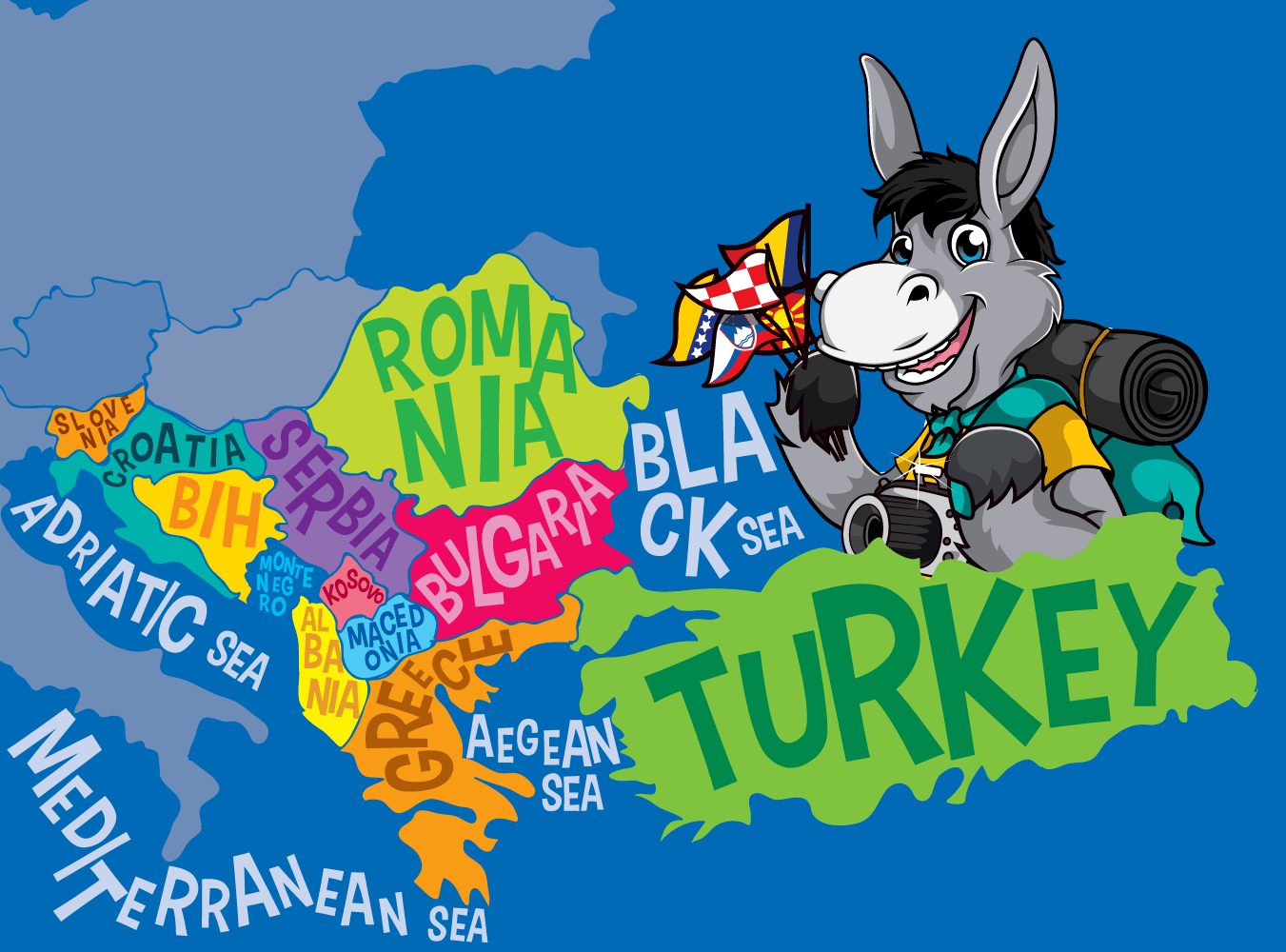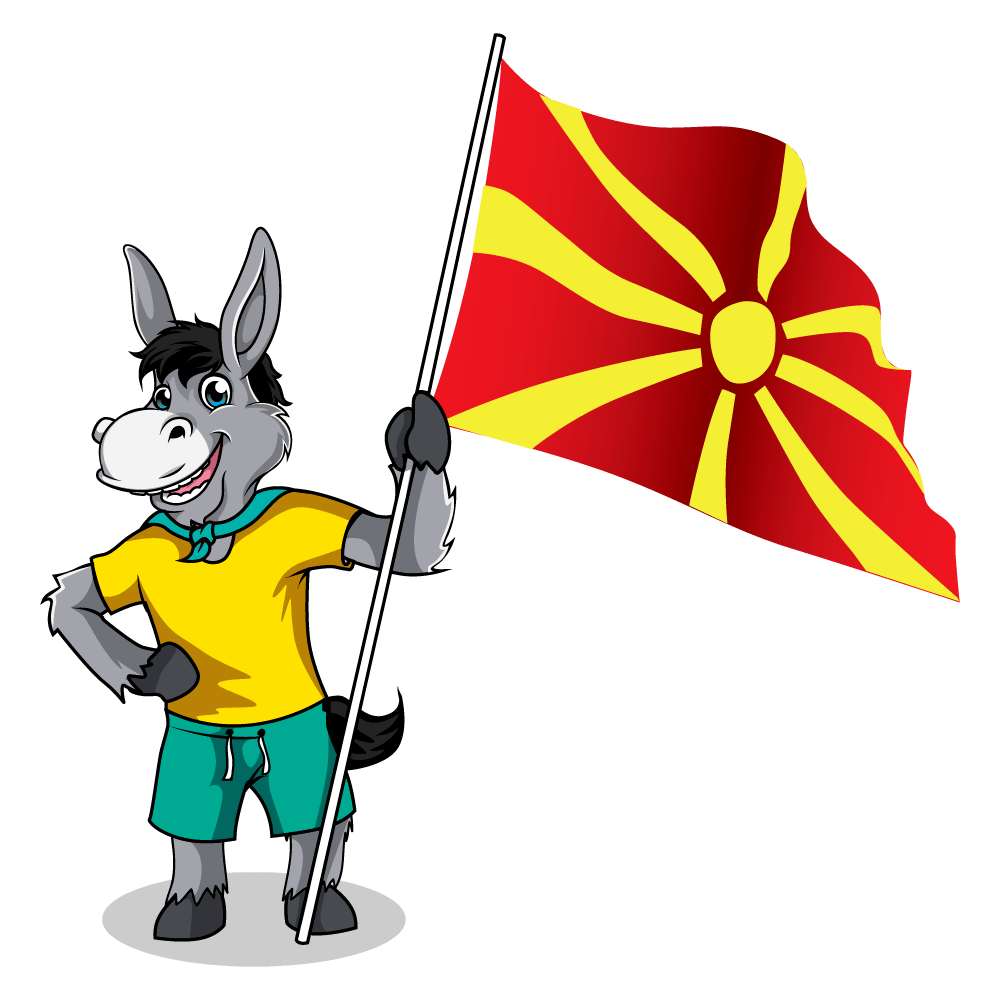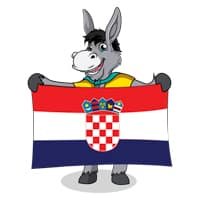There isn’t much general knowledge about tipping in the Balkan region, so if you’re lucky enough to be exploring this magical part of the world, you need to know a few pieces of practical tipping information.
In the Balkans, you’ll notice each country has its own currency, which comes in various denominations, and different socially acceptable rules when it comes to the fair amount to tip.

If you want to avoid awkward situations when the bill comes in, a restaurant or your hotel porter has dropped your case in your room, and you’re not sure what to do, read ahead; our tipping guide has all the Balkans countries listed (or coming very soon).
It’s a solid idea to arm yourself with tipping information before you go – so you do not overtip – or offend your hosts.
Skip Ahead To My Advice Here!
Tipping in Albania

Currency Information
Currency: Albanian Lek (Lek)
Denominations: Notes: 200 to 5000. Coins: 1- 100
Other currencies accepted: You may find that your Euros are taken, especially in large towns and cities, but if you’re heading off somewhere a little more rural or you’re buying something on the market, you should have some Lek with you, just in case. It’s best to change your money when you arrive to get the best exchange rate and avoid using other currencies wherever possible to cut down on inconvenience.
How To Tip In Albania
Some countries have a strict tipping rule, but Albania is not one of them. However, if you choose to leave a tip, your server or the person concerned will be very grateful for it. Having said that, if you don’t feel the service was kind enough, you’re also well within your rights not to leave anything either.
If you feel you want to tip, round up the bill to the nearest full amount in restaurants and bars, and if you’re going to, tip between 5-10% of the bill. Tipping is more common in restaurants; there is less emphasis on whether you should tip or not at bards – of course, if you feel your server made you a great drink and was friendly, they’ll love the extra 5 to 10% tip.
You don’t have to tip your taxi driver unless you feel they were very friendly or helped you out somehow. In that case, the amount you tip is at your discretion. For tour guides, 10% of the tour price is a good rule of thumb to go by.
As for hotels, while they will tell you that you don’t have to tip, it’s nice to do so if they’ve looked after you. Anything up to 200 Lek is an ample amount for a full stay. It’s adorable to tip your cleaning staff, i.e., the maids, if they have done an excellent job of keeping your room clean. Some people also choose to leave their unused or half-opened toiletries for maids, but this is not a tip.
While Albanians don’t receive abysmal wages, they’re not on very high ones either, so hotel staff will be highly grateful for any tip you want to give them. Do expect some arm waving and them saying, “no, you don’t have to do that,” because that’s just them being polite. So, if you want to tip, you may have to be persistent.
Tipping In Bulgaria

Currency Information
Currency: Bulgarian Leva (LV)
Denominations : Notes: 2 – 100LV. Coins: 1LV, 2LV, Stotinki 1-50
Other currencies accepted: Bulgaria a country within the Balkan region where you will struggle to pay with anything other than Leva. Your Euros will not be welcome unless there is a very dire emergency, and as a result, failing to change your cash when you arrive will mean you’re wasting time when you could be off exploring! You might find that Dollars are accepted, but again, this is not guaranteed and is likely to be at the discretion of the store you’re attempting to buy something in.
How To Tip In Bulgaria
There is no hard and fast rule for tipping in Bulgaria, but workers will be very grateful for any tip you choose to leave, especially in the tourist resorts, towns, and cities. Bulgarian wages are relatively low compared to other neighboring countries, and they often rely on tips to top up their salaries at the end of the month. If you’re visiting Bourgas or Varna in particular, you’ll find a growing tipping culture; and it has become customary.
Tips are heavily relied upon, particularly in bars and restaurants, with 10% of the bill the regular tipping amount. If you really feel that your service was high quality, a little more will be much received. Bartenders will also appreciate a tip of between 1 to 2 Lev; if you want to make it a little less awkward, when you receive your bill, round your amount up to the nearest suitable round figure and then leave before you get your change – way less cringe!
Tour guides also rely upon tips to boost their salaries, and in this case, 10% of the tour’s cost is an excellent marker to go with. If you want to tip your taxi driver, round up the fare to the nearest whole number.
Along with restaurant and bar staff, hotel staff will very much appreciate any tips you give them. Around 2 Lev for every suitcase you have is enough when tipping porters, and if you want to tip your maids, you could think about between 1-2 Lev for every day you’re staying.
Even though tipping is a little more prevalent in Bulgaria than in some other countries in the region, it is still optional, especially away from the major towns and cities. In rural areas, tipping isn’t really the done thing, but again, if you want to say thank you for a job well done, go ahead and tip.
Tipping In Bosnia & Herzegovina

Currency Information
Currency: Bosnian Convertible Mark (KM)
Denominations: Notes: 10 – KM200. Coins: 1 – KM5, 5-50 Fenig
Other currencies accepted: You will almost certainly need to change your money into KM when you arrive because this is one of the most problematic currencies to find outside of the country. For that reason, make sure that you spend all of the KM you have before leaving. You will discover Euros are accepted in some places, but not that widely. As a result, it’s best to have local cash on you, especially if you’re traveling away from the major towns and cities. If you pay with Euros, you’re like to get a pretty reduced exchange rate for your efforts.
How To Tip In Bosnia & Herzegovina
Tipping is quite common in Bosnia & Herzegovina but by no means mandatory. If you’re out and about and you receive top service from perhaps a small cafe or eatery, likely, you won’t be expected to tip, but again, it’s always nice to do so if you really enjoyed the experience.
In the main towns and cities, you may find that some restaurants include a service charge, which is basically instead of a tip. The best practice here is to look at your bill and check whether this has been included already; if so, you don’t need to tip. If there is no service charge, you can choose if you want to tip and if so, around 10% of the bill is an excellent mark to aim for.
The same goes for bars; if you’re in an upmarket bar or, if you’re in the large towns and cities, you may find that a service charge is included on your bill, but if not, go with what you feel in terms of the service you received.
As for other service workers, such as tour operators and taxi drivers, the same advice really goes as with the other countries we’ve mentioned so far. A 10% tip is a useful marker if you want to tip a tour guide who has shown you the major sights around the place you’re basing yourself. If you take a taxi, there is no expectation that you will tip, but if you want to round it up to the nearest round figure, you can do that and will receive thanks in return.
Hotel workers aren’t on the highest wages, as with most Balkan countries, so, if you want to thank your cleaning staff or porters, a small tip will be gratefully received. There is no set amount here, so whatever you feel, the service was worth.
Brands We Use And Trust
Tipping In Croatia
Currency Information
Currency: European euro (EUR). The Euro is divided into cents and, like all currencies, uses a combination of coins of note.
Denominations:
Croatian Euro banknotes are found in the following denominations:
5, 10, 20, 50, 100, 200, 500 – although I have not yet seen a 5oo in Croatia!
Croatian Euro coins come in eight denominations:
1, 2, 5, 10, 20, and 50 cents, and 1 and 2 euros.
Other currencies accepted: None. So be sure to carry euros or credit cards with you.
Now, if you’re visiting Croatia, the good news is that there is not a big tipping etiquette. Generally, gratuities are not widely expected, but that certainly doesn’t mean that they’re not appreciated!
How To Tip In Croatia
The best rule of thumb to use here is that if you feel you experienced outstanding service and staff who were friendly and attentive, then, by all means, go ahead and leave a few extra euros.
It’s worth remembering that servers in restaurants and cafes don’t really earn so much, and although they do not expect you to leave a tip, every little really does help.
Having lived in Croatia for six years, I wrote this massive guide to tipping in Croatia here.
Tipping In Macedonia

Currency Information
Currency: Macedonian Denar (MKD/Den)
Denominations: Notes: Den10 – Den5000. Coins: Den1 – Den50
Other currencies accepted: If you want to use your Euros in Macedonia, you’re going to struggle in a big way. There are very few currencies (if any) that are widely accepted in Macedonia apart from the local currency, which means you must remember to change your cash either just before you travel or when you arrive in a large change office or bank. Also, make sure you have some smaller denominations (not Den5000) if you’re purchasing small items in rural areas or smaller towns, as you may struggle to get change.
How To Tip In Macedonia
Wages in Macedonia are traditionally low, but despite that, you won’t find a tipping culture. You’re not expected to tip, but as a tourist, if you enjoy the service, as with other countries, it’s a nice and appreciated thing to leave a little token of your enjoyment.
In bars and restaurants, if you notice that there is a service charge on your bill, you don’t need to tip at all. But, this is only likely to happen in large tourist areas or big cities. The chances are there will be no charge, and you can decide for yourself whether you want to tip or not. In this case, 10% of the total cost of the bill is a general marker to aim for. If the service was really exceptional, you might like to think about leaving 15% as a maximum amount.
Tour guides don’t expect a tip, but you should think about 5 to 10% of the tour’s cost if you really enjoyed your day and found the guide to be helpful. As for taxi drivers, it’s a better idea to set your rate before you get into the car, and as a result, you won’t need to tip because everything is included in the price you have arranged. However, if you had terrific service, i.e., you had a free tour on your way with a knowledgeable driver, you could think about adding a little extra! Do, however, remember only ever to get a taxi from a registered taxi rank to avoid typical tourist scams.
If you have received excellent service from your hotel staff, you could tip them also; however, they will not expect it. Anything up to 20 MKD is average.
Away from the large towns and cities, it is always best to have low denominations of cash with you, and remember to spend all your Macedonian currency before you leave, as changing it over once you’re across the border will be very difficult indeed!
Tipping In Montenegro

Currency Information
Currency: Euro (EUR)
Denominations :Notes: 5 – 100 EUR. Coins: 1-2 EUR, 5-50 cents
Other currencies accepted: Good news here because Montenegro has the Euro! However, that in itself is no good if you’re traveling solely around the Balkans, as it’s one of only a few countries that actually has this continent-wide currency! Despite that, some places will accept other currencies, such as Dollars. It’s a handy idea to have low denominations of Euros on you for rural areas and markets. However, you will be able to change any larger denominations you have when you leave the country in most other Balkan states.
How To Tip In Montenegro
The major tourist hotspots such as Kotor Bay are opening up to the idea of tipping so that you will find a tipping culture in Montenegro much more than some of the other countries around it. Despite that, it’s not mandatory, and you’re not going to be cursed if you decide not to do so! It really depends on whether you feel the service you received is worthy or not, and if so, it’s a good rule of thumb to go up to 10% of the bill price as a tip.
If you visit some of the larger restaurants in the main tourist resorts, perhaps a more upmarket choice, you may find that a service charge is placed on your bill. In this case, the tip has already been decided for you, and you don’t need to think about whether or not to leave one.
The same advice as to the other Balkan countries really goes in Montenegro too, so if you want to tip a tour guide for a job well done, you should think about anything between 5-10% of the tour costs you in the first place. However, this isn’t expected by any means and will be accepted with grace.
Taxis don’t require tips per se, but if you can, round it up to the nearest Euro if you want to leave a small tip as a thank you.
Hotel staff, such as the cleaning staff and porters, will always be very grateful for any tip you want to leave. How much you leave is really up to you as there is no hard and fast rule here. A couple of Euros for every day you stayed is generally more than enough.
As a side note, do remember to carry small denominations of Euros with you if you’re going to a small restaurant or cafe, as they won’t really appreciate having to give you all their change!
Tipping In Slovenia

Currency Information
Currency: Euro (EUR)
Denominations: Notes: 5 – 100 EUR. Coins: 1-2 EUR, 5-50 cents
Other currencies accepted: Another country using the Euro is Slovenia, so if you’re traveling between Montenegro and Slovenia, you won’t have any problems with your cash! Despite that, make sure you have change with you if you’re heading away from the major towns and cities, as they’re not going to want to change large denominations. You may find that other major currencies, perhaps Dollars, will be changed in some places, but it’s always best to have Euros as this is not guaranteed at all. If you want to change other currencies, it’s best to go to a bank and do so.
How To Tip In Slovenia
Slovenia has only really just opened up to the idea of tipping, and this is mostly in the major towns and cities, and not in the rural or smaller areas. It’s worth considering that Slovenian staff aren’t paid wonderfully well, so anything you do give them will be very gratefully received. Restaurant and bar staff, in particular, are often paid minimum wage only and rely upon tips in the tourist resorts to top up their salaries every month.
In bars and restaurants, if you enjoyed the service, a standard 10% of the bill is an excellent mark to aim for. If the service was super-amazing, you could go for more, but this is your choice alone. If you receive inferior service, do not feel that you have to tip. You also don’t need to tip a bartender unless you really want to.
Slovenia is one country where tour guides don’t actually expect to be tipped at all. This is quite unusual; however, if you want to do so, you can tip if you feel like you experienced fantastic service from a knowledgeable guide. In this case, 5-10% of the tour price is more than enough.
The fact that Slovenia is not really a tipping country means that you’re free to choose who you want to tip your hard-earned Euros towards, and if you are in a taxi, the good news is you don’t have to tip at all, as it’s really not expected. If you want to, a couple of Euros is more than enough. The same can be said for service staff in your hotels, such as porters and cleaners if you feel that they looked after you very well during your stay.
Tipping In Serbia

Currency Information
Currency: Serbian Dinar (RSD)
Denominations: Notes: RSD10 – RSD1000. Coins: RSD1 – RSD20
Other currencies accepted: It’s always a great idea to be aware of tensions between neighboring countries, and if you’re traveling to Serbia in particular, bear in mind that bordering Kosovo is not on the same currency. If you attempt to use Euros in Serbia, you will possibly offend, but you’ll undoubtedly get an abysmal exchange rate if nothing else. If you’re visiting the border area with Kosovo, you might be able to change your Euros there, but it’s unlikely and not really an excellent idea to try.
How To Tip In Serbia
The tipping culture in Serbia has only really just arrived, and as a result, you’ll only really notice it in the major towns and in Belgrade itself. You won’t usually see service charges on your final bill, so it’s then up to you how much you want to tip in bars and restaurants if you want to tip at all. If you felt the service was of a high standard, you’re free to tip anywhere between 10-15% of your final bill, but feel free not to do so if you didn’t enjoy the time you spent there. You could also round up your account around if you are in a smaller cafe or eatery.
You should, however, be aware that if a band of musicians visits your table and you show enjoyment of their performance, they will hang around a little and see if a tip is forthcoming. It can be awkward if you’re not aware of it, so in this case, give them a small tip, however much you want to offer, and they will be grateful. They will then leave you alone!
Tour guides aren’t typically subject to tips, but it’s personal discretion if you want to do so. The same goes for taxi drivers, but if you feel you want to give a tip, it’s enough to round up the fare to the nearest 100.
If you’re staying in a hotel and you receive top service from porters and cleaning staff, you should consider around 1000 RSD for every bag you have for porters, and around 1000 RSD for cleaning staff, for every day you’re staying. However, don’t feel you necessarily need to do this if you didn’t think the service was up to much.
Tipping In Kosovo: How To Tip In Kosovo

Tipping in Kosovo isn’t as much of a ‘thing’ as it is in many other European countries, so most people won’t be offended if you don’t do it. However, if you feel that the service you received deserved a tip, then go ahead, and you won’t offend anyone. It’s also a nice thing to do, considering how low the wages are in Kosovo.
Currency Information
Currency: Euro
Denominations: Notes – 5 – 500, Coins – 1 & 2 euro notes, 5 – 50 cents
Other currencies accepted: You may find that the Serbian Diner is accepted, although this will only be in the majority Serbian areas. Cash is used more often than credit and debit cards, although you will be able to use these in the major cities, especially in Pristina. You’ll find ATMs in major cities.
How To Tip In Kosovo
Because tipping isn’t at all common or even expected, you won’t usually tip in taxis or at hotels. Despite that, if you want to, round your taxi fare up to the nearest Euro for taxis and a small, set amount per day in your hotel. Again, it’s not expected, so you’re not at all obliged to do so.
If you’re visiting a restaurant, particularly a more upmarket choice, then you can choose to tip 10% of the bill if you want to, although it won’t be looked for. You also won’t find a service charge added on to your bill, even in the capital. You’re also not expected to tip bartenders if you choose to head out for a few drinks, but again, if you want to round up the nearest Euro and leave the change for the bartender.
Tour guides aren’t really an exception in Kosovo either, which makes visiting this country entirely stress-free. Again, however, if you really do feel that the service you received warranted a tip, or you want to help out the local economy and local workers, then perhaps 10% of the cost of your entire tour will be very greatly received and appreciated. However, be aware that the tour guide, or whoever you’re tipping, is likely to look at you slightly in embarrassment because of the general non-tipping environment you’ll find in Kosovo.
Tipping In Romania

Currency Information
Currency: Romanian Leu (RON/Lei)
Denominations: Notes: 1- 100 Lei. Coins: 1 – 50 Bani
Other currencies accepted: If you have Euros left over, you might be able to use them in Bucharest; it’s doubtful they will accept them anywhere else, especially in smaller towns and cities. For this reason, it’s not a safe idea to rely upon, and it’s far better to change your cash before you arrive or using a reliable bank or change office when you do arrive.
How To Tip In Romania
Romania is a country that has actually embraced tipping. However, it’s not pushed at you, so you only need to tip if you really enjoyed the experience you had. If you’re in a bar or restaurant, you should tip something, with 5% for general high-grade service, up to 15% if you seriously enjoyed the service. In Romania, you are expected to tip bartenders, and it depends on how much you enjoyed your drinks as to what to tip – between 10-20% of the bill is the general rule of thumb.
When visiting Romania, you may also find that when you’re ordering fast food or you’re attending a spa or hairdressing salon, a tip might be hinted upon. Again, it’s up to you if you want to do so, but if you enjoyed the experience, give up to 10% of the bill for excellent service.
If you have been on a perfect tour and you want to tip the guide, you should think about 20 Lei for every day the tour lasted; however, if you seriously enjoyed it, you might want to add on more. On the other hand, if it was terrible, don’t feel obliged to tip anything! Taxi drivers are one area where tipping isn’t really expected, but you can round up your fare amount if you want to do so. You should realize that if you’re going to tip anyone, it’s best to do it in notes and not coins, as these really aren’t worth much and could cause offense!
Finally, if you’re staying in a hotel and want to tip the service staff, you could consider around 4 Lei for the cleaning staff, for every day you’re staying, and about 2 Lei for every suitcase you have, for the porters. If you use the services of a hotel concierge, it’s kind manners to tip them before you leave, with anything up to 15 Lei considered average.
Move This Adventure To Your Inbox & Get An Instant Freebie

No spam. Unsubscribe at any time.
Tipping In Turkey: How To Tip In Turkey
 Currency Information
Currency Information
Currency: Turkish Lira (TRY/TL)
Denominations: Notes – 5 – 200, Coins – 1 – 50 kurus
Other currencies accepted: In tourist areas, you will be able to use your UK sterling, Euros, and Dollars quite widely; however, you will receive a lower rate as a result. It’s better to change to the local currency if at all possible. There are countless ATMs in major towns, cities, and tourist resorts; however, you will struggle to pay with anything other than Lira if you leave the main cities and resorts. Many vendors will also turn away a 200 Lira note if the amount you’re paying is below 150 Lira, so try and have change if at all possible.
How To Tip In Turkey
Tipping in Turkey is very commonplace; however, if you feel you didn’t receive the best service, don’t tip. When dining in high-quality restaurants around the country and in many other restaurants across Istanbul, be sure to check the bill and look if a service charge/fee has been applied. If so, you don’t need to tip as this charge counts as your tip.
If a service charge/fee hasn’t been applied, it is customary to tip between 5-10% of the bill, depending upon how much you enjoyed the service you received. You should always tip in cash and leave the cash amount in the bill sleeve you will receive or give directly to the waiter. If you’re dining somewhere too high-end, a tip of between 10-15% is more likely.
In terms of taxis, hotels, and tour guides, the same advice applies. You can round up the amount to the nearest whole Lira or 10 lira amount if you’re tipping a taxi driver or tell them to keep the change. For hotels, 10 Lira per night, you’re staying in an acceptable amount, but again, if you feel the service wasn’t quality, you’re not obliged to do so.
For tour guides, around 10% of the tour’s cost is a fair amount to tip.
Wage levels are relatively low in Turkey, and many waiters and other staff rely upon tips to lift their take-home amount. Tips are, therefore, always much received.
Tipping In Greece: How To Tip In Greece
 Currency Information
Currency Information
Currency: Euros
Denominations: Notes – 5 – 500, Coins – 1 & 2 euro notes, 5 – 50 cents
Other currencies accepted: Dollars may be taken in some tourist resorts; however, Euros are the main currency accepted. You’re free to use your credit or debit card quite widely in main towns, cities, and tourist areas, although have cash handy if you’re heading into a more rural or smaller area, as you may struggle to find ATMs or restaurants with card machines. Outside of rural areas, ATMs are very widely available.
How To Tip In Greece
Tipping is quite common in Greece, however as with most other countries, you’re not obliged to tip if you don’t feel the service you received was worthy. If you’re dining in a restaurant, you should check the bill before deciding whether to tip or not; this is because a service charge or fee may already have been applied, which can be anything between 5-10% of the bill. This amount is instead of a tip, so if you see a service charge or fee, you don’t have to tip more.
If there is no fee added, it is customary to tip between 5-10% of your final bill if you feel the service was worthy of a tip. Give the tip amount in cash to the waiter, as some owners don’t allow their staff to keep their own tips. You could also tell your waiter that you don’t want the change as you pay.
If you want to tip in a hotel, perhaps to the porter or housekeeper, then around 1 Euro per bag for the porter is a good idea, with 1 Euro per day for the housekeeper. You can leave this on the bed or somewhere in your room where they can easily find it. If you used a concierge and you want to tip, you give the tip directly to them.
Tipping in taxis isn’t really expected or required, but if you want to do so, you can quickly round the oil up to the nearest Euro and tell the driver you don’t want the change. The maximum tip in a taxi is 5% of the final fare amount.
Tour guides are another group you may choose to tip if you really enjoyed the tour they gave you. Around 10% of the tour price is a good amount here, but the final choice is really up to you as there are no hard and fast rules here, and they will be grateful for any tip you choose to give them.
Tipping in the Balkans isn’t the same for each country, as you can see – if you have something we should add, please leave us a comment below.
- All About Traveling In The Balkans
- Guide To Backpacking In The Balkans
- Best Beaches In The Balkans
- Top Places To Go Hiking In The Balkans
- One Month Itinerary For Traveling Through The Balkans
- Ultimate 5-Day Balkans Travel Itinerary
- 17 Top Hotels In The Balkans
- 21 Things Not To Miss On A Balkans Road Trip
- Two Week Road Trip Itinerary Through The Balkans
- Balkan Cruises – Where You Can Cruise To In The Balkans


